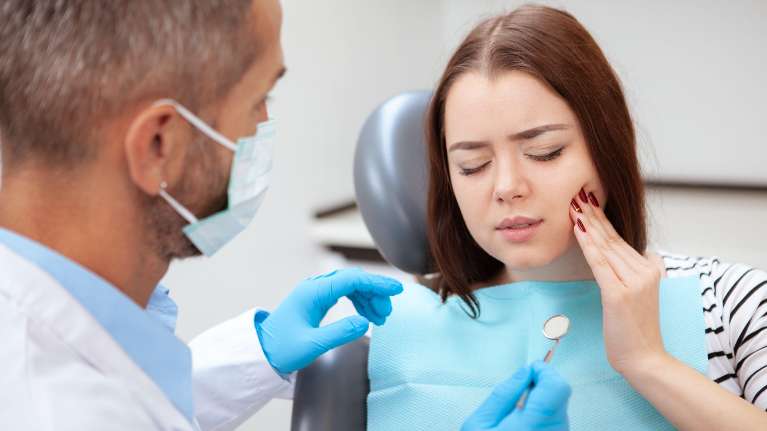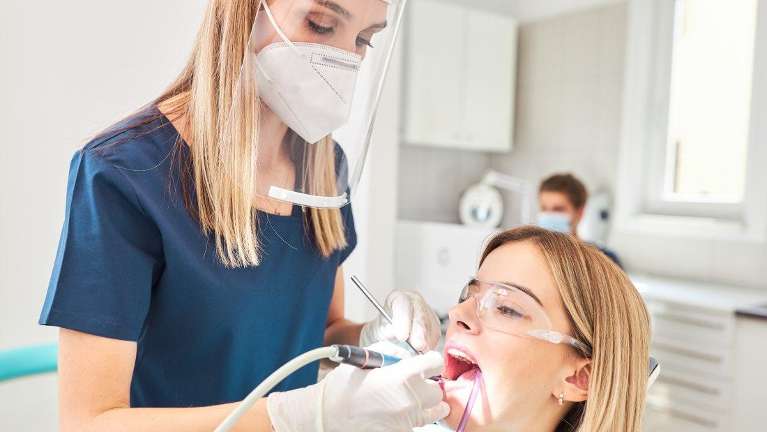
An unexpected dental surprise is most likely not the Christmas gift you’re hoping for. Sadly, dental emergencies do happen and sometimes can occur at the most inconvenient of times; the holiday season is no exception to this.
Fortunately - for these exact instances - there are always emergency dental clinics open on public holidays. So, if you find yourself suffering from a dental emergency this Christmas break, be assured that you’ll be able to access an emergency dentist near you. They’ll give you the prompt care you need, so you can enjoy the rest of your holidays.
Can I See an Emergency Dentist over Christmas and New Year?
Many patients wonder if dentists are open over the Christmas and New Year holidays. The short answer is, yes there are. Though clinics might be closed on certain dates, dentists understand that tooth emergencies can’t wait till the New Year to be resolved, which is why most emergency dental practices will keep open during the festive season in Sydney.
For residents of Paddington, Rose Bay, Bondi Junction and the general Woollahra area, take comfort in knowing that Paddington Dentistry’s emergency dental services will also be available over the holidays should you need it.
What Qualifies as a Dental Emergency?
If you’re experiencing swelling, pain, or mouth trauma of any kind, then it is considered a dental emergency. Slighter symptoms such as mild tooth sensitivity or a knicked gum can generally wait until your local dental clinic reopens post Christmas.
However, if your tooth sensitivity is persistent, doesn’t go away, or becomes unbearable, then you should arrange to make an emergency dental appointment. Persistent sensitivity can mean that you may have a cavity or an infection which needs to be treated immediately before it worsens.
Other dental emergencies include bleeding gums, sores in your mouth, or any symptoms that cause immense discomfort and/or pain. At Paddington Dentistry, dental situations that we’ve commonly treated as an emergency include:
- Bleeding in mouth
- TMJ pain
- Loosened or knocked out tooth
- Cracked or chipped tooth
- Toothache
- Any oral pain
- Severe or sudden tooth sensitivity
- Lost fillings
For the more serious situations, e.g. you think your jaw may be broken, it is recommended that you go to your nearest hospital emergency room rather than an emergency dentist.
What to Do If You Suffer a Dental Emergency
If you experience a dental emergency that requires you to go see your emergency dentist, it is recommended that you do the following at-home toothache remedies, to control the pain and provide relief, before coming in:
- Control any bleeding in the mouth by applying gentle pressure with a clean cloth or gauze.
- Use over-the-counter pain medication to help relieve your tooth pain, such as Ibuprofen. Always consult your dentist or pharmacist before taking any medicines.
- If you have a toothache, rinse your mouth with warm water to clean it and use dental floss to remove any food that may be stuck between your teeth. Avoid placing aspirin on your gums or teeth because it may burn the gum tissue.
- If you have a chipped or broken tooth, try to find any pieces of the tooth and bring them with you to the dentist. Rinse your mouth with warm water and apply a cold compress to the area to reduce swelling.
- If you have a lost filling or crown, try to locate the fitting and bring it with you to the dentist. In the meantime, apply a small amount of clove oil to the sensitive area to reduce discomfort.
- If you have an abscess (pus-filled pocket that can form at the base of a tooth or in the gums), rinse your mouth with warm salt water and apply a cold compress to the area to reduce swelling. Seek immediate dental treatment, as an abscess can become a serious condition.
- It is important to remember that a dental emergency should be treated by a dental professional as soon as possible. If you are unable to reach your dentist, go to the nearest emergency room for treatment.
- Sleep with your head elevated on a thick pillow, as elevation can help relieve pain, reduce swelling, and improve circulation.
Can a Cracked Tooth Be Saved?
A cracked tooth causes severe pain, which is why it’s classified as a dental emergency. If the crack in your tooth has made its way into the pulp, your dentist can help save your tooth by performing a root canal. But, if the crack extends below your gum line then, unfortunately, the tooth must be extracted. The faster you seek treatment for a cracked tooth, the better chance you have of saving it.You’ll know if you have a cracked tooth if you feel pain when chewing or exposing the tooth to cold or hot temperatures.
In most cases, your dentist will need to do an X-ray to locate the exact location of the crack. At Paddington Dentistry, we use panoramic X-rays and digital X-rays, alongside other advanced dental technology to identify dental issues at their earliest stages through vividly detailed images. This way, we’re able to treat your dental issues before they worsen and cause long-term problems.
What to Do If My Regular Dental Office Is Closed?
If your local dental office is closed, you can still call your dentist and schedule an appointment for emergency dental care.
At Paddington Dentistry, even if you’re not an existing patient, you can always call us to let us know about your symptoms so we can assess the severity of your dental situation and advise you on the best course of action to take.
How Can I Prevent Dental Emergencies?
Whilst some dental emergencies are unforeseeable, there are preventive measures you can take to maintain healthy teeth, which in turn can avert many unwanted dental emergencies - especially during the holidays.
Every dentist’s foremost recommendation is to have a diligent brushing and flossing routine at home. This ensures that food and plaque is regularly removed from between your teeth so that it doesn’t build up and cause disease. In addition, consider reducing the intake of sugary drinks, like soft drinks. It will limit your need for emergency dental care, because sugar is the main cause of tooth decay and cavities.
It is also important to protect your teeth against hard impact. Where possible, avoid eating hard foods or crunching on ice because this can not only cause a cracked tooth, but also a chipped tooth. Another way to avoid such dental problems is by not treating your teeth as bottle openers to open drinks. Lastly, if you’re involved in contact sports always wear a mouthguard so your teeth don't get knocked out. In fact, mouthguards can also be recommended by dentists for patients who frequently clench their jaw or grind their teeth.
Along with the above, you should also follow through with going to routine dental appointments for cleanings, at least twice a year. Regular dental appointments can help prevent emergencies because your dentist will be able to identify any signs of infection or cavities at their early stages.
Final Thoughts
Dental emergencies are unpredictable, as they can happen at any time.
We hope our patients enjoy the festivities of Christmas and New Year without dental problems. At the same time, Paddington Dentistry will continue to support its patients (new patients are always welcome) by providing emergency dental care services during the holidays.
If you believe yourself to be suffering a dental emergency contact us for a phone consultation or to book an appointment. Our only closing dates are between Friday 23rd of December to Monday 2nd of January.

